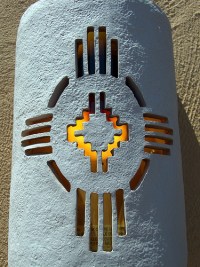Zia Symbol
Like other Native American Pueblos, the Zia believed in spirit beings known as Kachinas, which could inhabit and / or control just about anything tangible or intangible. The Sun has a kachina, as does water, fire, wind, crops, health... plus several hundred other entities.
In the 16th century, Spanish settlers tried to force Christianity onto the Zia. Pulling the Native Americans away from their beliefs required strong action by the conquistadors and Zia's ancient religious festivals and ceremonies were outlawed.
Whilst Kachinas are not considered deities to be worshipped, it makes sense to treat such powerful beings with respect and not upset them. So unsurprisingly the Zia resisted the conquistadors' demands and fought (literally) to keep their old customs, festivals and ceremonies.
In the uprising of 1689, for both the European settlers and the indigenous population, issues other than religion were also at stake. Fertile land and control of water were two precious resources that both sides fought over. Despite their firepower and modern military tactics, the Spanish were defeated and fled south. Nine years later, however, the soldiers returned in greater strength and took control of the territory, almost wiping out the Indian population. By 1892, only about 120 ethnic Zia remained.
Today, it is recognised that the Zia are no threat and their belief system is tolerated, even respected, to the point that a Zia symbol is incorporated in the flags of New Mexico State and its largest city, Albuquerque.
The Zia rayed Sun symbol has four arms each of which has four parts. 'Four' is an auspicious or sacred number for the Zia: the four points of the compass, the four periods of each day, four seasons of the year, four stages of life, and the four sacred obligations for one's physical, mental, spiritual and social health.
Red and yellow were used on 16th century flags of the Spanish conquistadors, since their military flag was a red Burgundy Cross on a yellow field. .
On the left is a Zia Cross Porch Light at Old Messilla, New Mexico. The central part of this cross mimics the Andean Chakana Cross.
Photo © and reproduced with the kind permission of Vladimir Lavenko
See also Sun Cross
See also Cardinal Cross
See also Burgundy Cross



